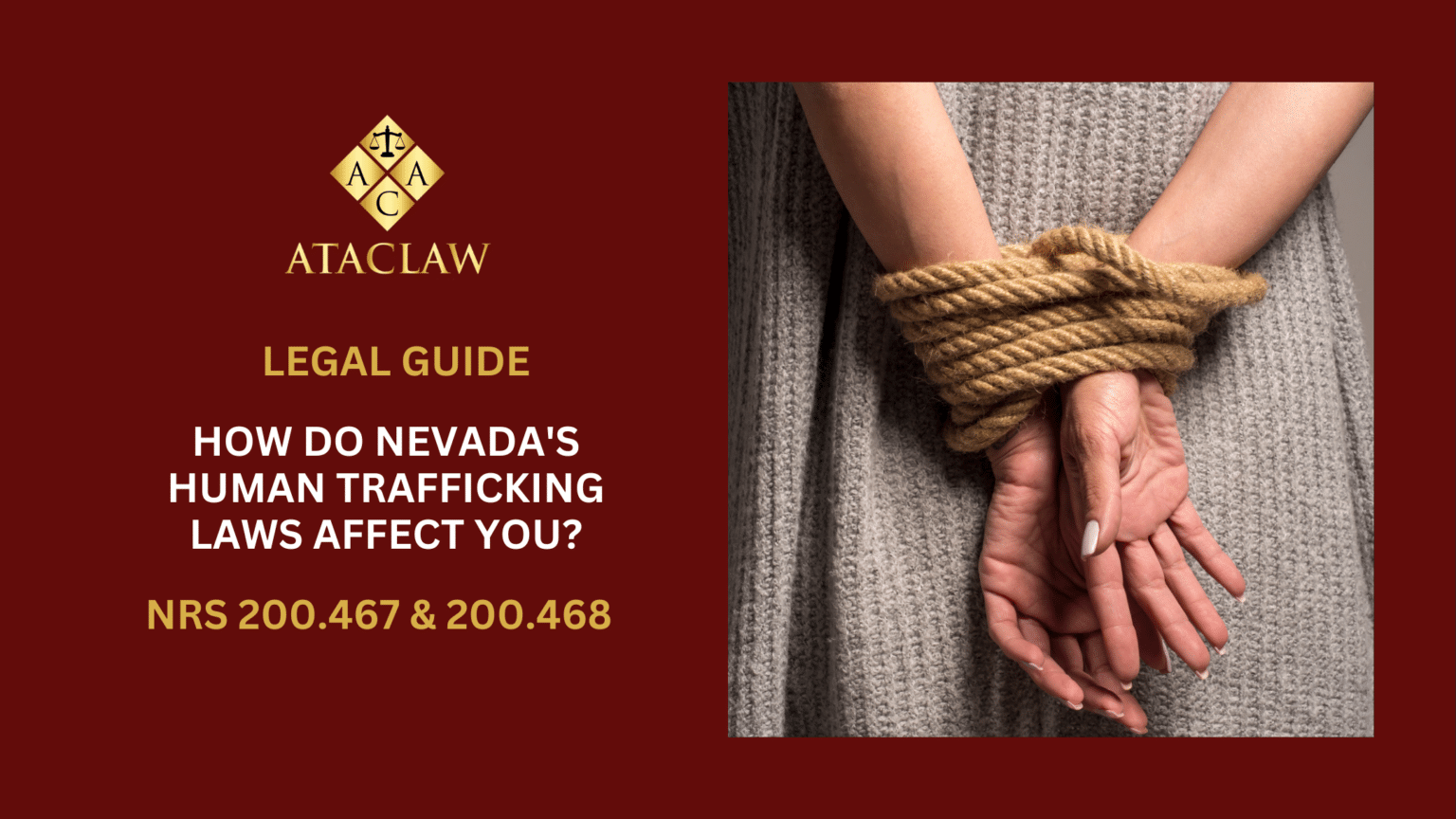Human trafficking laws, specifically statutes NRS 200.467 and NRS 200.468, serve as critical components in the state’s efforts to combat exploitation and protect vulnerable populations. Human trafficking is a term that encompasses a wide range of illegal activities aimed at exploiting individuals for financial gains or other unlawful purposes. At ATAC LAW, we are committed to demystifying these laws, ensuring that the public understands their rights and obligations within this framework, and providing rigorous defense for those unfairly accused.
How Does Nevada Define Human Trafficking?
In Nevada, human trafficking involves the illicit trading of people, coercing them into labor or sexual exploitation. Victims often hail from regions such as Mexico, East Asia, and Eastern Europe, deceived by promises of employment or education in the United States. Traffickers maintain control over their victims through various forms of abuse including physical, sexual, and emotional mistreatment.
Common scenarios of human trafficking include:
- Coercing Mexican workers into laboring for minimal or no compensation in a factory in Washoe County;
- Smuggling Colombian individuals for illicit purposes into Nevada;
- Forcing Russian women into prostitution at a so-called “gentleman’s club” in Las Vegas, an act that falls under sex trafficking as well.
With human trafficking being one of the fastest-growing criminal enterprises globally, Nevada and federal law strictly prohibit this crime:
Nevada law specifically addresses the trafficking of individuals, discriminating between trafficking for financial benefits and trafficking for illicit purposes, covered under NRS 200.467 and NRS 200.468, respectively. Additionally, NRS 200.4685 focuses on child trafficking, outlawing the transport of minors for monetary gain or to evade responsibility.
Examples include:
- A situation where factory managers pay individuals to smuggle workers into Nevada for unpaid labor at a factory. Regardless of their role in the process, all parties involved are liable under human trafficking laws.
- Another example would be a factory owner deceiving illegal immigrants with the promise of employment, intending to force them into involuntary servitude. Even if the victims escape before reaching the factory, the mere intention of exploiting them constitutes human trafficking.
Moreover, it’s possible to be convicted of both trafficking for financial gain and for illegal purposes if both motives are present in a case.
Child Trafficking: It’s illegal to transport minors, whether domestic or foreign, for any form of value or to shirk parental responsibilities.
Federal Prosecution of Human Trafficking
On a federal level, human trafficking violations are pursued vigorously, with cases often managed in Federal District Court within Nevada. Enforcement agencies include Immigration and Customs Enforcement (ICE) and the Criminal Section of the U.S. Department of Justice Civil Rights Division.
These laws serve to protect victims and prosecute offenders, with those freed from trafficking situations potentially eligible to apply for a T-Visa for residency.
Understanding Nevada’s stringent stance against human trafficking highlights the legal ramifications awaiting those who engage in this reprehensible crime, emphasizing the state’s commitment to eradicating human exploitation.
What Legal Defenses Can Be Used in Human Trafficking Cases in Nevada?
Facing charges of human trafficking in Nevada can be daunting due to the complexities and severe implications of the crime. Defendants have several defensive strategies at their disposal, dependent on the specifics of their case. Here are some potentially viable legal defenses:
1. Unawareness of the Victim’s Status: A crucial component in prosecuting adult trafficking cases is proving the accused was aware—or should have been aware—that the victim was not legally in the country. The prosecution must establish this fact beyond a reasonable doubt. If they fail to do so, there’s a strong case for dropping the charges.
2. Absence of Financial or Illegal Motive: The intent behind human trafficking charges often revolves around financial gain or the pursuit of illegal activities (or, in cases involving minors, the intent to shirk responsibility). Demonstrating that the accused had neither financial nor illegal intentions can be a critical defense. Defense attorneys might refute such motives by scrutinizing evidence like wiretaps, banking transactions, and testimonies that the prosecution may use to build their case.
3. Violation of Rights by Law Enforcement: In instances where law enforcement might have overstepped their boundaries, particularly concerning illegal searches, a defense attorney can file a motion to suppress any evidence procured from such actions. Should the court find merit in this argument, it could lead to the dismissal of the case due to insufficient evidence.
In the legal battles surrounding human trafficking allegations in Nevada, understanding these defenses is paramount. They highlight the necessity for meticulous legal representation that can navigate the intricacies of the law, ensuring that the rights of the accused are fully protected. Each case hinges on its unique facts, making the selection of a skilled defense team crucial for those facing these serious charges.
What Are the Penalties for Human Trafficking in Nevada and Federally?
Human trafficking, a grave crime both in Nevada and across the United States, attracts severe penalties under state and federal law, with the potential for charges to be reduced or even dismissed under certain circumstances.
Nevada’s Legal Repercussions for Human Trafficking
The severity of penalties in Nevada hinges on the trafficker’s intentions:
- For Financial Gain (NRS 200.467): Trafficking individuals for monetary benefits is a Category B felony, punishable by 1 to 10 years in prison and possibly a fine up to $50,000, based on the judge’s decision.
- For Unlawful Purposes (NRS 200.468): This offense also falls under a Category B felony with a stiffer penalty ranging from 1 to 20 years in prison, with the possibility of a $50,000 fine at the judge’s discretion.
- Trafficking of Minors (NRS 200.4685): Trafficking a minor either for value exchange or to shirk responsibility is deemed a Category C felony. Convicted individuals face 1 to 10 years behind bars and may also incur fines up to $10,000, subject to judicial discretion.
Victims of human trafficking in Nevada may seek restitution through civil lawsuits against those who transported or benefitted from their trafficking, claiming various forms of monetary compensation, including actual, compensatory, and punitive damages, treble damages, as well as attorney fees and costs.
Federal Penalties for Human Trafficking
At the federal level, penalties vary based on the trafficking purpose:
- Forced Labor: Individuals found guilty of trafficking for forced labor can face up to 20 years in federal prison, along with fines. Certain aggravating circumstances, such as kidnapping, attempted kidnapping, aggravated sexual abuse, or murder, can elevate the maximum sentence to life imprisonment.
- Trafficking Children for Sexual Exploitation: The federal sentencing for this crime depends on the minor’s age and whether force, threats, fraud, or coercion was involved in their trafficking. The sentences are as follows:
- Victims under 14 years old: 15 years to life in prison.
- Victims between 14 and 17 years old (with force, threats, fraud, or coercion): 15 years to life.
- Victims between 14 and 17 years old (without force, threats, fraud, or coercion): 10 years to life.
These stringent penalties underscore the legal system’s commitment to combating human trafficking, reflecting the severity of the crime and its damaging impact on individuals and communities.
Can Human Trafficking Charges Affect Your Immigration Status?
Non-citizens in the United States facing charges that involve moral turpitude, such as those under NRS 200.267 or NRS 200.268, must confront the stark reality of the immigration consequences: these offenses qualify as grounds for deportation. Immigration laws come down hard on those convicted of serious crimes, placing their ability to remain in the U.S. under severe jeopardy.
How Does Nevada Penalize Human Trafficking for Financial Gain?
Under the legal framework of the State of Nevada, engaging in the transport of non-citizens without legal entry rights into the state for monetary benefits falls under stringent scrutiny. Specified under Nevada Revised Statute 200.467, this act categorizes serious human trafficking offenses tied to financial gains. Individuals found guilty of such transgressions face heavy penalties, being subjected to a Category B felony. This not only entails a significant imprisonment duration ranging from a minimal term of one year to a maximum of ten years but also carries the possibility of a hefty fine, reaching up to $50,000.
The legislation details are clear: it’s illegal for anyone to transport, assist in transporting, or arrange for the transportation of another person into Nevada if there’s knowledge or suspicion that the individual lacks the legal authorization to enter or remain in the United States, with the intent of financial compensation.
Legal culpability extends beyond the direct act of transportation. Even indirectly facilitating or aiding in the transport of such individuals marks a violation under this statute. The gravity of the charge is underscored by the potential for severe sentencing, emphasizing Nevada’s tough stance on combating human trafficking.
Defense against charges stemming from NRS 200.467 could hinge on demonstrating the accused’s lack of knowledge regarding the victim’s legal status in the U.S. However, claims of ignorance offer no shield if the individual involved turned a blind eye to evidence suggesting the transported person’s unauthorized status in the U.S.
Is It Possible to Seal Records of Human Trafficking Convictions?
When it comes to erasing the stigma of a criminal record, particularly for human trafficking charges, Nevada’s laws offer limited pathways. The ability to seal a conviction record hinges significantly on the nature of the trafficking offense and the age of the victim involved.
- Trafficking an Adult: If the conviction involves trafficking an adult, the law provides a pathway to potentially seal the record. This process can begin five years after the completion of the case, offering a ray of hope for individuals looking to move past their conviction and reintegrate into society fully.
- Trafficking a Child: However, the situation is drastically different if the trafficking offense involved a minor, in accordance with NRS 200.4685. For these grave offenses, the law takes a stringent stance, making it clear that convictions are ineligible for sealing. This delineation underscores the severity with which the legal system views trafficking of minors, emphasizing a commitment to long-term accountability for such crimes.
- Dismissed Charges: It’s important to note a distinction for charges that don’t result in a conviction. In instances where human trafficking charges are dismissed—meaning the accused was not found guilty—record sealing is immediately available. This immediate eligibility reflects the principle of not penalizing individuals without a conviction, allowing them to seek relief and clear their names swiftly.
Understanding the nuances of sealing criminal records, especially for serious offenses like human trafficking, is crucial for individuals seeking to navigate their legal rights and rehabilitative prospects. While the law offers a path to redemption and privacy restoration for some, it also reinforces a steadfast commitment to protecting society’s most vulnerable, particularly children, from the horrors of human trafficking.
For further legal assistance and to discuss your case with an expert, don’t hesitate to contact ATAC LAW.




